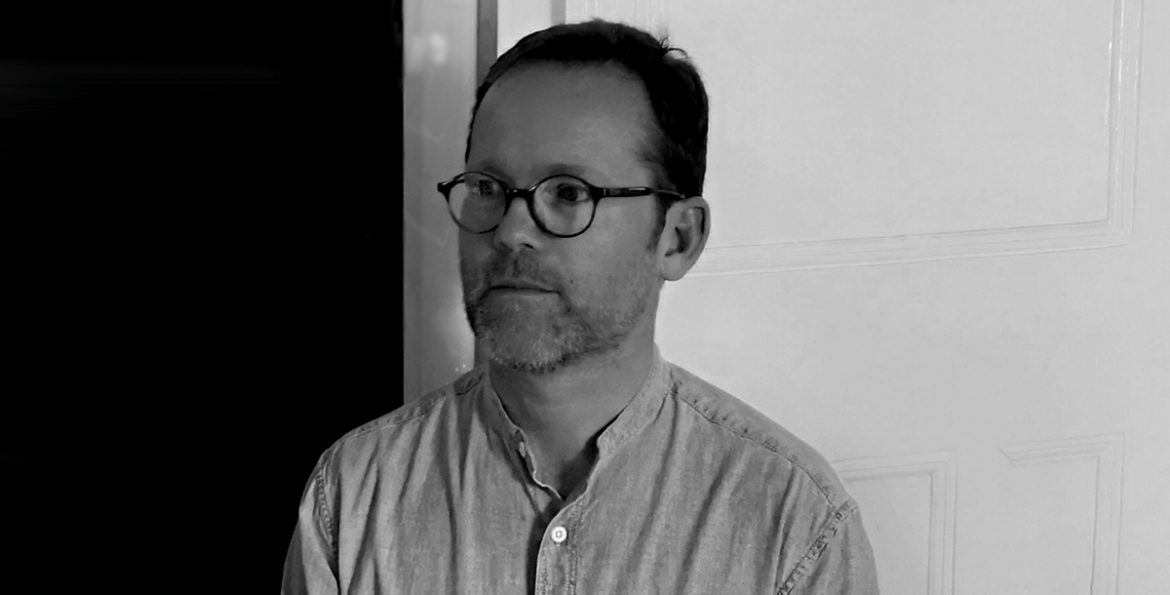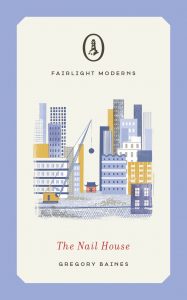

Gregory Baines: Interview
- 13th August 2019
- Category : Author,Blog,Interviews & Blogs
Gregory Baines is the Australian-based author of The Nail House, a novella released by Fairlight Books on 1 August 2019. Taking place in China, the novella focuses on Lindon, an Australian project manager, and Zhen, a Chinese real estate agent, as they meet and overcome cultural difference. Throughout the story, the image of the ‘nail house’ looms over them. We’ve talked to Gregory to find out what inspired this story and about his writing.
How did you start writing?
I wrote a short story in year two and a very encouraging teacher praised me; I didn’t realise at the time, but I think it had the effect of making me think of myself as a ‘story teller’ of sorts. Then through high school I wrote poetry and a few really bad short stories.
Did you always want to be a writer?
Not always. It wasn’t really till I was at university that I picked up a book of Peter Carey short stories and thought they were the most amazing things I had ever read. I plunged into writing short stories then and improved with a lot of hard graft. That was the start of really wanting to be a writer. Now I have lost the religiosity but still have the love of writing.
Have you ever experimented with other types of writing?
I wrote news for a student newspaper at university, and wrote bad poetry all through school and university. It was the regular blogging in China that, unintentionally, turned me into a writer. My first novel came out of that experience.
If you could describe The Nail House in one word what would it be?
Tong Zhi (Chinese word for ‘Comrade’). The Nail House is about comrades that span countries, cultures and time.
 The novella is written from the perspective of both main characters. Was one side easier/harder to write than the other?
The novella is written from the perspective of both main characters. Was one side easier/harder to write than the other?
The female character was only ever intended to be a minor character. I put a lot of effort into the male voice, and perhaps because there were no real stakes for me with a ‘minor’ female character, I just wrote and it really felt right. Some early readers found the female character to be really powerful. I was worried I was poorly representing her, but the feedback was positive and I decided to have a go at splitting the narrative in half inspired by The Girl Who Played Go by Shan Sa; it was a big help to see how well this kind of structure could work. In the end I enjoyed the female character much more, and she really did seem to come to life. For me the book is about her. The male character was a lot of hard work. A great deal more editing and working went into that side of the story, it was a real struggle and a source of anxiety. A few times I almost abandoned the book because of that male character, but Zhen Yi kept bringing me back.
The novella presents a lot of interesting Chinese cultural habits. How much of this is based on your experience living in the country and how much on research?
I did very little research for the book, aside from brushing up on a couple of real-life ‘nail house’ dramas. The father was based on a dear friend’s father and some of the old retired people I would see talking around the exercise areas of apartment blocks in places I lived. All the rest came from experiences I have had, friendships and relationships. My wife is Malaysian Chinese and we met in Shanghai. I would run ideas past her to make sure I didn’t get any of the culture ‘wrong’. I felt pressured at the beginning to get it ‘right’ but the more I have thought about this the more I think it is true there are many ways we can see a culture and I have accepted this is my spin on it.
What’s the most surprising thing you’ve learned through your writing?
That truth is always stranger than fiction. It’s a cliché, but every time I write something I think is a bit too ‘unreal’ I am proven wrong.
What has been the hardest part of The Nail House to write?
No one section was particularly difficult. I don’t do a lot of detailed planning before I start to write; I find for me that dampens the spontaneity of the work. The down side of that is I write, and follow the writing where I feel it needs to go which creates all sorts of plotting issues. Editing and revising for me is 99% of the hard work.
Another issue is China itself – it changes so quickly I was always anxious to get it finished before the country changed beyond recognition. Writing about the place has a ‘used-by’ date. I remember being in a shop the last week before we left for Australia, and someone was using their thumb print to pay for a product. When I fist arrived in 2000 they had only just rolled out cash-cards and there weren’t even credit cards in most places.
What do you hope people take away from reading The Nail House?
I hope that it gives western readers a small sample of the diversity of the Chinese experience. It is a country that is treated in the shallowest, narrowest terms in the west – it’s quite alarming. It is a wonderful place, it will always be my second home. I hope it generates some curiosity and affection for the place and its people.
What do you think makes a good novella?
Strong story and clever ideas. There isn’t as much time to develop the characters so I think it needs to compensate the reader in wit and cleverness.
What does writing mean to you?
I am a teacher, and this comes out in the way I write and the themes I am interested in. So it is about teaching always, but it’s also about giving people an emotional experience outside of themselves.
What inspires your writing?
A frustration that the world is not as just as it should be. We know this, we know this more than we did before, but as societies we don’t do enough to change it. Writing is a chance to engage emotions and it’s the emotions that change the world.
Do you have a writing schedule?
Writing is hard work and I work full time as well as a history teacher in a secondary school. I used to get up at 5am to write before everyone woke up, but I don’t like to do that now. I just try to write a little each day, even if it’s just an edit, or reading some old chapters. It’s important to do something every day, but don’t force things too much. You just have to keep going, try not to stop and if you do forgive yourself.
Where do you tend to write?
We now live in an old house, but we haven’t been there long. I’m working on another novel at the moment and in the warmer months I sit on the front veranda near the roses and drink tea and write. When it’s cold I migrate to different rooms of the house; I get restless quickly.
What’s your favourite book/author?
Peter Carey’s The Fat Man in History, a collection of short stories, some of the finest writing I have seen, a real inspiration; Shan Sa – The Girl Who Played Go is the most powerful novel I have ever read, and brings the historical period she writes about to life in a way that is compelling.
Do you have a pet peeve when it comes to writing?
I get very easily distracted. Being online all the time is a curse. I fight with myself constantly. Some of this is born out of isolation – writing is a very lonely chore, particularly when you are editing and the great ideas have dried up.
Do you have a writer’s habit that helps you ‘get in the zone’?
I drink lots of tea, and take breaks in the garden. Doing something physical, even just a walk, is good. I used to paint a lot more and I’d sometimes split my time between a canvas and the writing and that was fantastic.
Do you feel like you writing style has changed over the years you’ve been writing?
When I was younger I made the characters conform to the initial story idea, which made the work brittle and weak. Now the characters and I sort of negotiate the story, compromise. We fight skirmishes with each other.
What’s a piece of advice you can give to aspiring authors?
Read good fiction and learn from that, mine it for ideas that inform your own approach and help you develop your own style. Don’t stop writing. Never give up, commit to it. It’s a very lonely art form so look after yourself along the way.
Place your order for The Nail House here, or for book bundle options for the Fairlight Moderns visit our online shop.














